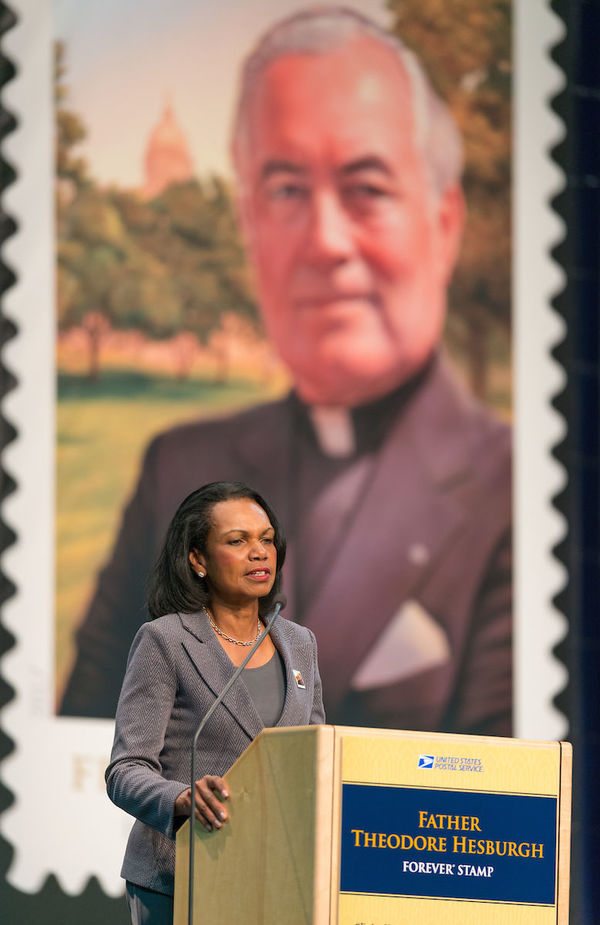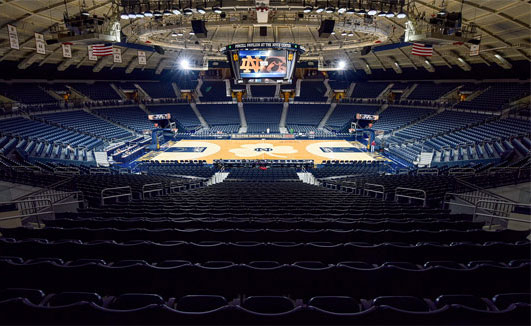A stamp honoring the late Rev. Theodore M. Hesburgh, C.S.C., president of the University of Notre Dame from 1952 to 1987, was unveiled during a ceremony Friday (Sept. 1) at Purcell Pavilion inside the Joyce Center on campus.
The ceremony featured remarks from former Secretary of State Condoleezza Rice, a 1975 Notre Dame graduate; Megan Brennan, postmaster general and CEO of the U.S. Postal Service; and Rev. John I. Jenkins, C.S.C., Notre Dame president.
Rev. Austin Collins, C.S.C., religious superior of Holy Cross Priests and Brothers at Notre Dame, offered the invocation, and Rev. Thomas J. O’Hara, C.S.C., provincial superior of the U.S. Province of the Congregation of Holy Cross, offered the benediction.
Former Notre Dame basketball coach Digger Phelps, who once served on the Citizens’ Stamp Advisory Committee for the Postal Service, emceed the event.
The first woman to serve as postmaster general, Brennan referred to Father Hesburgh as a “champion of social justice, an advocate for international aid and an emissary for peace” who advised presidents and popes “on the tough issues facing people and government.”

“It’s a privilege to celebrate and commemorate the life of Father Hesburgh,” Brennan said. “To an organization like the Postal Service, which is dedicated to public service, Father Hesburgh epitomizes the ideal of service to others, to community and to country.”
Father Jenkins, referencing the Latin word for priest, referred to Father Hesburgh as a true “pontifex,” or “bridge builder.”
“As a priest, Father Ted devoted his life to building bridges. Bridges between people who are estranged, bridges between man and woman and God, bridges between nations, bridges between faiths,” Father Jenkins said. “His lifelong commitment to civil rights was an expression of that calling to be a bridge builder.”
“We celebrate his transcendence,” Rice said of Father Hesburgh. “For more than a century, the United States Postal Service has honored Americans who are transcendent, Americans who transcended the place they were born, the titles that they held, the work that they did. Who transcended the time in which they lived. To be part of a timeless transmission of the values that we so admire, the values of faith and justice and belief in equality — and not just the ability to tolerate those who are different, but to really admire and embrace them — that transcendence is also a part of Father Hesburgh’s heritage, because it is who he was.”
The hour-long ceremony coincided with the first day of issue for the stamp, which is available on campus at the Hammes Notre Dame Bookstore, at post offices nationwide, at USPS.com or 800-STAMP-24.
Based on a 1980 photograph, the 49-cent Forever stamp features an image of Father Hesburgh against a backdrop of the iconic Golden Dome with the words “Fr. Ted Hesburgh Forever USA” printed below.
“You’ll see a likeness that exudes the warmth and openness Father Hesburgh was known for,” Brennan said of the portrait. “The smile is subtle and the eyes are fixed ahead, capturing his benevolence and his determination.”
Hundreds of people attended the ceremony, which coincided with the first Notre Dame home football weekend of the season.
Hesburgh’s brother Jim Hesburgh, there with more than 60 family members, thanked the crowd.
“It is a great honor, and I want you to know that this family appreciates your presence,” he said.
In addition to his 35-year tenure as Notre Dame’s president, Father Hesburgh’s other notable achievements and accolades included:
- 16 presidential appointments — from Presidents Dwight Eisenhower to George W. Bush — in which he was involved in most major social issues including civil rights, peaceful uses of atomic energy, campus unrest, Third World development and immigration reform. In addition to the civil rights commission, other notable appointments were to the Presidential Clemency Board, charged with deciding the fate of various groups of Vietnam offenders; the National Science Board; Commission on the Holocaust; and Select Commission on Immigration and Refugee Policy.
- Service to four popes, three as permanent Vatican City representative to the International Atomic Energy Agency in Vienna from 1956 to 1970.
- Service as chair of the International Federation of Catholic Universities.
- Election to the Board of Overseers at Harvard University, including two years as board president, the first priest in either position.
- Service as co-chair of the Knight Commission on Intercollegiate Athletics.
- The honor of being the first person from higher education to be awarded the Congressional Gold Medal, presented in 2000, and receipt in 1964 of the Presidential Medal of Freedom, the nation’s highest civilian honor.
- Reception of 150 honorary degrees, the most ever awarded to one person.
Father Hesburgh was born May 25, 1917, and raised in Syracuse, New York. He was educated at Notre Dame and the Gregorian University in Rome, from which he earned a bachelor’s degree in 1939. He was ordained a priest of the Congregation of Holy Cross, Notre Dame’s founding order, in 1943.
Following his ordination, Father Hesburgh continued his study of sacred theology at the Catholic University of America in Washington, D.C., earning his doctorate in 1945. He joined the Notre Dame faculty the same year and served as chaplain to World War II veterans on campus in addition to his teaching duties in the religion department. He was appointed the head of that department in 1948, and the following year was appointed executive vice president in the administration of Rev. John J. Cavanaugh, C.S.C. At the age of 35 in June 1952, he was named the 15th president of Notre Dame.
The accomplishments of the Hesburgh era at Notre Dame are reflected in statistics comparing the Notre Dame of 1952, when Father Hesburgh became president, with the University he left in 1987. The annual operating budget rose from $9.7 million to $176.6 million, the endowment from $9 million to $350 million, and research funding from $735,000 to $15 million. Enrollment increased from 4,979 to 9,600, faculty from 389 to 950, and degrees awarded annually from 1,212 to 2,500. Two major changes during the Hesburgh era were the transference of governance in 1967 from the Congregation of Holy Cross to a two-tiered, mixed board of lay and religious Trustees and Fellows, and the admission of women to undergraduate studies in 1972.
Father Hesburgh died Feb. 26, 2015, at age 97.
Notre Dame has been recognized by the U.S. Postal Service on three previous occasions — in 1988 with a stamp honoring legendary football coach Knute Rockne, in 1998 with a stamp of the famous football backfield known as the Four Horsemen and in 1992 with a postcard celebrating the sesquicentennial of the University.
 The Hesburgh Stamp Unveiled
The Hesburgh Stamp Unveiled